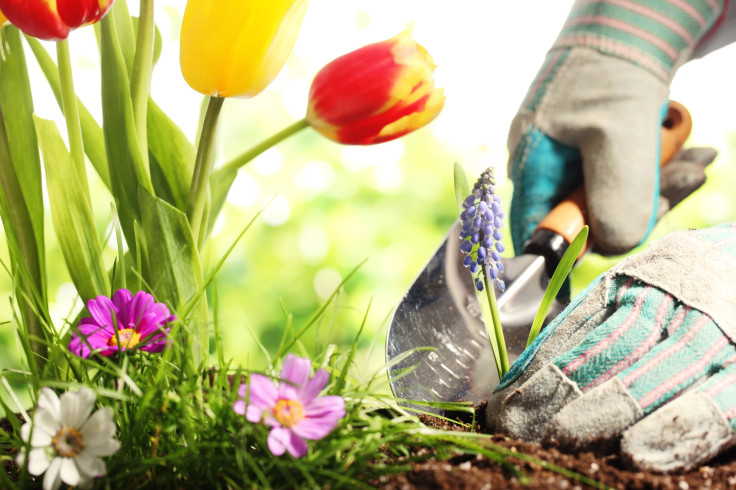Spend Your Earth Day Taking Care Of Nature — And Your Health

Nature and personal health go hand in hand, though it may be hard to believe and difficult to implement in this digital age.
Luckily, April 22 is Earth Day — a day to become more aware and mindful of your natural surroundings. So put down the iPhones, computers, iPads, and turn the TV off — today is a day to sit in the grass, take a walk in the garden, and look at the clouds. I promise, it’s more fun than it sounds.
Besides, you may very well be suffering from good old “nature deficit disorder” because you’re constantly staring at a screen and never really see the light of day.
Studies have shown that ecotherapy, or “green therapy,” is good for your overall well-being — both physical and mental. Spending time in nature, and especially exercising in green areas, can actually help reduce depression, anxiety, and other mental illnesses while pushing you to become more physically active.
One study published in 2013 found that depression was reduced among people who took walks in nature, compared to people who walked through shopping centers. “Our research shows people commissioning mental health services and social care that a holistic treatment like ecotherapy delivers not only health benefits, but wider social benefits and cost savings that medication could not,” Paul Farmer, chief executive of Mind, said in a press release about the study.
Below are some ways to jump-start your nature awareness with healthy activities.
Bike Riding
OK, so it’s a lot easier to bike when you’re in Copenhagen or Amsterdam — cities where the bikes outnumber cars and people. But if you have a bicycle, Earth Day is a good time to pull it out of its winter storage. Bike to work one day a week instead of driving or using public transportation — it saves money, gas, and is also good exercise. If everyone in the U.S. who lived 5 miles from their workplaces biked to work, they would reduce the amount of total household emissions by six percent.
Bicycles are known to reduce the “carbon footprint,” which is the emission of carbon dioxide through motor vehicles. And they’re pretty efficient on many levels. “Bikers tend to be in good shape and are less likely to be obese than motorists,” National Geographic writes on its bike buying guide. “This means they typically use less energy on everything from transportation to food production.”
Gardening
Gardening sounds like a lot of work, but it’s also really good for your health. Some people see it as an antidote of sorts to the modern world — getting your hands dirty in the soil and creating life in the form of plants is a refreshing cure to our lives hooked up to computer screens. “When you sit at a desk all day, there’s something about literally putting your hands in the dirt, digging and actually creating something that’s really beautiful,” Gillian Aldrich, a 42-year-old gardener in New Jersey, told CNN. “There’s something about just being out there that feels kind of elemental.”
Research supports the theory that gardening can improve well-being, with studies that show gardening can reduce the risk for mental illness. Another study found that people who are involved in community gardening tend to have lower BMIs than people who don’t garden.
Connecting with Nature
There are plenty of different ways to maximize these health benefits of nature. Even if you live in a big city, plan trips outside of the urban environment every few weeks just to get your dose of trees and relaxation. Otherwise, spend time walking in a park every morning to help you find your balance.
When we hear about Earth Day today, we often forget how it started or what it was meant to change in the minds of millions. In our daily lives, it’s easy for us to forego the simple things like home-cooked meals, a walk in a quiet natural setting, or disconnecting from phones and other technologies. But these things can go a long way.
During the first Earth Day events that occurred in 1970, activists hoped they could raise awareness about the environment while bringing people together to acknowledge the significance of nature in our lives.
“Lord knows what we thought we were doing,” Denis Hayes, a Harvard Law School dropout who helped organize the first Earth Day demonstration in 1970, said. “It was wild and exciting and out of control and the sort of thing that lets you know you’ve really got something big happening … What we were trying to do was create a brand new public consciousness that would cause the rules of the game to change.”
Hayes described the first Earth Day event, in which nearly 20 million people participated:
It was a huge high adrenaline effort that in the end genuinely changed things. Before (that), there were people that opposed freeways, people that opposed clear-cutting, or people worried about pesticides, (but) they didn’t think of themselves as having anything in common. After Earth Day they were all part of an environmental movement.
Though we’re not living in the 1960s or 70s anymore, and you’re probably not likely to call yourself a hippie or tree hugger, remember that respect for nature is quite synonymous to respect for yourself and your own body. Paying more attention to the green around you may not only help the environment, but it will most likely help you, too.
Published by Medicaldaily.com



























